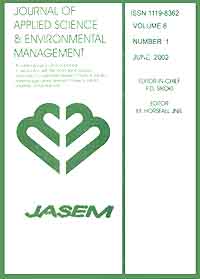
|
Journal of Applied Sciences and Environmental Management
World Bank assisted National Agricultural Research Project (NARP) - University of Port Harcourt
ISSN: 1119-8362
Vol. 21, No. 3, 2017, pp. 538-544
|
 Bioline Code: ja17058
Bioline Code: ja17058
Full paper language: English
Document type: Study
Document available free of charge
|
|
|
Journal of Applied Sciences and Environmental Management, Vol. 21, No. 3, 2017, pp. 538-544
| en |
Histological Effects Aqueous Extract of Allium sativum  (Alliaceae) Bulb on Bone and Spleen of Adult Wistar Rats (Alliaceae) Bulb on Bone and Spleen of Adult Wistar Rats
ODIASE, DE & OSAZEE, LO
Abstract
Allium sativum , commonly known as garlic is a member of the Alliaceae
family and it is one of the earliest known medicinal plant. The aim of this study is to evaluate
the histological effects of aqueous extract of Allium sativum bulb on selected organs (bone
marrow and spleen) of the mononuclear phagocyte system using adult Wistar Rats. Twenty adult
Wistar rats were grouped into four experimental groups: A, B, C and D. Rats in group A served as
control and were administered distill water daily for period of five weeks. While groups B, C
and D were administered aqueous extract of Allium sativum bulb orally at doses of 150, 300 and
600mg/kg body weight daily for a period of five weeks respectively. At the end of the experiment the
animals were sacrificed, the spleen and bone marrow were harvested and fixed in 10% buffered
formalin for histological studies. Photomicrographs of processed slides were taken using light
microscope. The result obtained in the various treatment groups revealed in a non-dose dependent
fashion increase in cellularity and myeloid- erythoid cells in the bone marrow and mild
lymphoid follicular activation accompanied by sinus histiocytosis in the spleen. In conclusion,
administration of aqueous extract of Allium sativum bulb showed enhanced immunostimulatory
properties in the bone marrow and spleen of adult Wistar rats. Dietary supplement with Allium
sativum can boost the immunity of Individuals living in communities with low socio-economic
status who are prone to malnutrition and infections.
Keywords
histological; sinus histiocytosis; mononuclear phagocyte system; cellularity myeloid- erythoid cells
|
| |
© Copyright 2017 - Journal of Applied Sciences and Environmental Management
|
|
